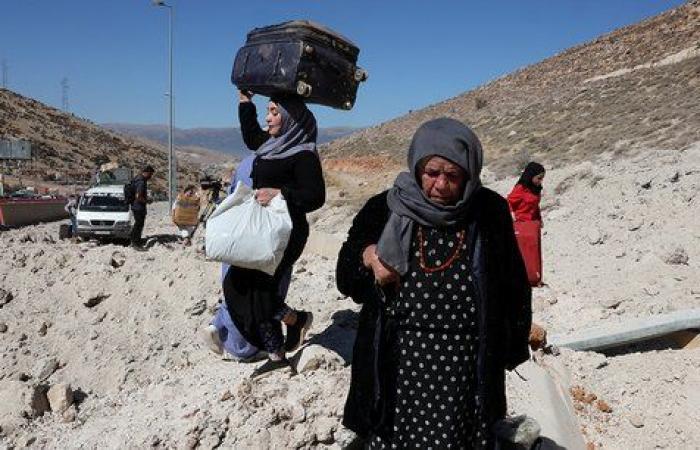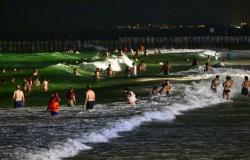The ground shook again in Beirut yesterday afternoon. Once again, it was the southern suburbs of the capital, a stronghold of Hezbollah, which was targeted by the Israeli bombardment. As it was the night before and all those that have passed since September 27. That day, ten missiles fell on Hezbollah headquarters in Haret Hreik, killing Hassan Nasrallah, the secretary general of the Shiite movement. Of the six buildings that overlooked it, all that remains is a pile of rubble.
Since this attack, this area, usually one of the most populated in the capital, has been empty. The metal shutters of the stores are lowered. Only the dull hum of the drones is heard. Even the army checkpoints which monitored the entrances and exits from these neighborhoods were deserted. The men of Hezbollah, usually omnipresent, are invisible. At the bend of a street, a pile of ruins still smoking. Or a shop on fire. No one is trying to turn it off anymore. Hezbollah’s stronghold has become a ghost town.
Lebanon: World Bank redirects $250 million in aid
Tripoli region affected
It is not only Dahiyeh, the other name given to the southern suburbs, which has been deserted. Southern Lebanon has also become a no-man’s land. According to the latest estimates from the Lebanese authorities, nearly 1.2 million people have fled their homes since the escalation of violence. That is more than 20% of the population. While some of the displaced were able to be accommodated by relatives or rent accommodation, others had no other choice but to take refuge in schools transformed into reception centers. It is in one of them, in Saïda, 50 kilometers south of Beirut, that Fatima Abdel Nabbé settled after an endless journey.
The 24-year-old tells her story: “On Monday September 23, the Israelis started shelling our village. » Fatima had given birth ten days earlier. The cesarean section had been complicated. She had been bedridden ever since. “We had no choice, she continues. We got in the car and fled. » Her husband had already left for Beirut for work, her mother and sisters did not know how to drive, so she took the wheel. “I was forced to drive eleven hours straight for a trip that normally only takes one, specifies the young woman. I was breastfeeding while driving, the baby wouldn’t stop crying, I was exhausted. » Although the family initially planned to reach the capital, Fatima’s cesarean became infected during the trip. “We arrived in Saida; I was taken directly to the hospital,” she remembers.
The family then failed in this school. There are fifteen of them living in a classroom. “As soon as there are bombings in the surrounding area, my daughter starts to tremble, she becomes afraid, sighs his mother. But what can I do? » Living conditions are precarious. Toilets and sinks are taken over. These are the only water points in the establishment which allow you to shower as well as wash clothes or dishes.
Two classrooms away is Marwa, a young mother of a 6-month-old boy from Markaba, a village located a few kilometers from the Israeli border. With her family, she had moved several times before settling in Nabatieh, a town spared from the war until recently. Then, that same Monday, September 23, the Israeli army began bombing the neighborhood where she had taken refuge. “Suddenly, I no longer saw anything, she says. The rescuers pulled us from the rubble and took us to the hospital. » With tears in her eyes, she cries: “We have nothing left! My daughter is undergoing treatment but I can no longer find the medicine… We couldn’t even get a single item of clothing back. »
If hundreds of thousands of families took to the road that fateful Monday, the trips have not stopped since. Every day, the Israeli army sends messages to residents of new communities asking them to evacuate. Generally, a few minutes or a few hours later, these villages are shelled. The more the conflict takes hold, the more the bombings spread to the north of the country. For the first time, yesterday, the Tripoli region was hit by a strike targeting a Palestinian camp.
The Israeli army entered Lebanese soil
“I’m so scared”
But in recent days, it is mainly the capital which has been targeted. Its southern neighborhoods, of course, where, during the night from Thursday to Friday, Nasrallah’s successor, Hachem Safieddine, would have been eliminated, according to the Israeli army. But also the heart of the city. A strike this week hit a residential building in Jnah, which borders the sea. A few hours later, Khaled watches, on the sidewalk, the flames which continue to devour the building. Originally from Tyre, the large city in southern Lebanon, he took refuge in this neighborhood which he believed to be safe with his two little daughters and his wife, seven months pregnant. “We came here to the hotel to be safe, he proclaims. It’s a Sunni neighborhood with families and lawyers living there. There is no Hezbollah here. » He adds: “I have an American passport, so do the girls. But I can’t leave my pregnant wife here. She is Lebanese and does not have a valid passport. To do it again, she would have to return to Tyre, which is impossible! »
Other displaced people decide to take the road towards Syria. In ten days, nearly 310,000 people crossed the border between the two countries, sometimes crossing the mountains on foot. Hadi, crossed at the Masnaa border post on Thursday, is one of them. For twenty-five years, he lived in Jouaiya, a village in South Lebanon where he worked as a tiler. And then the war knocked on his door. “I only had time to take the children, he whispers. We came with the clothes we were wearing at the time. » If he has made the decision to return to his country of origin, nothing awaits him there. Visibly disoriented, this father, a widower, explains: “I’m going to go to Damascus with the children and then I’ll see what I do. » He admits to fearing the regime: “Of course I’m scared, I’m so scared… I never imagined I’d set foot in Syria again, but it’s that or getting bombed in Lebanon. » Hadi was one of the last this week to be able to cross the border. On Friday, Masnaa was struck three times by the Israelis. The passage, which has become vital, has since been closed.






